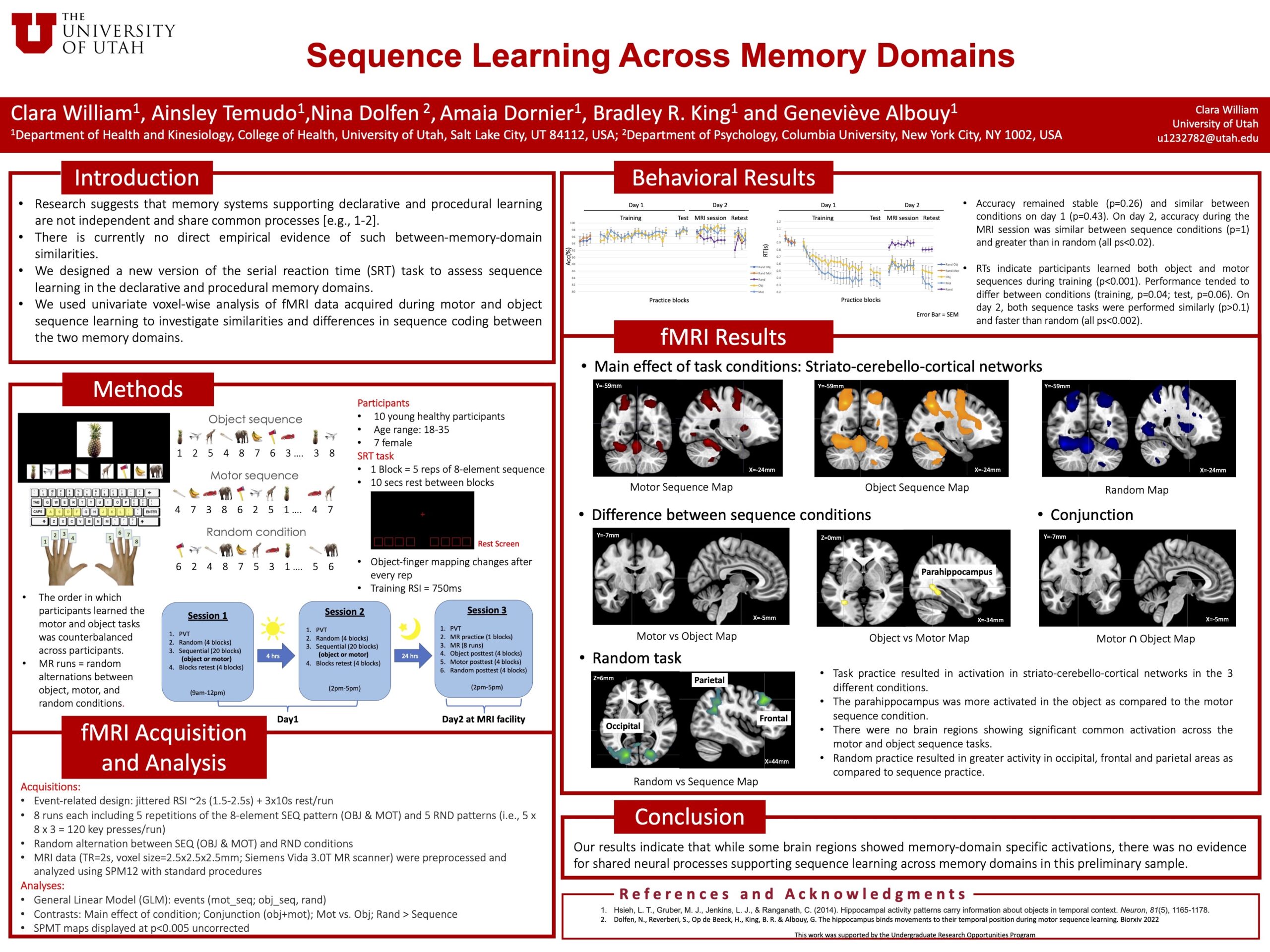Presenter Name: Clara William
Description
Previous research suggests that memory systems supporting declarative and motor learning are not independent, sharing common processes. However, there is no direct empirical evidence of such between-memory-domain similarities. The goal of this study was to address this knowledge gap.
We designed a new version of the serial reaction time (SRT) task, with pictures of objects as visual cues to trigger motor responses. There are three different versions of the task: an object sequence task (sequence of objects paired with random key presses), a motor sequence task (sequence of key presses paired with random objects), and a control task (random keys and objects). Thirteen healthy participants (age: 18-30, 8 female) learned the two sequence tasks 4 hours apart. Consolidation of the sequence tasks was assessed with an overnight retest.
Behavioral analyses of response time indicate that participants learned object and motor sequences to the same extent (block effect [BE]: F(19,228)=20.29, p<0.001); condition effect [CE]: F(1,12) =2.87, p=1.12; condition by block effect [CBE]: F(19,228)=1.19, p=0.26). Data acquired during the post-training test showed that performance plateaued similarly between conditions (BE: F(3,30)=1.54, p=0.22; CE: F(1,10)=0.54, p=0.47; CBE: F(3,30)=0.27, p=0.847). During the overnight retest, performance improved similarly between conditions (BE: F(3,30)=6.63, p=0.001; CBE: F(6,60)=4.19, p=0.001). Performance differed between conditions (CE: F(2,20)=22.04, p<0.001) such that both sequence tasks performed faster than the random task, and performance was similar across sequence tasks.
These results indicate that our newly designed SRT task allows memory development from different domains in one training day. There was similar retention of the sequence-specific knowledge across memory domains during the overnight retest. Moving forward, analyses of neuro-imaging data will unravel the neural processes supporting sequence learning across memory domains.
We designed a new version of the serial reaction time (SRT) task, with pictures of objects as visual cues to trigger motor responses. There are three different versions of the task: an object sequence task (sequence of objects paired with random key presses), a motor sequence task (sequence of key presses paired with random objects), and a control task (random keys and objects). Thirteen healthy participants (age: 18-30, 8 female) learned the two sequence tasks 4 hours apart. Consolidation of the sequence tasks was assessed with an overnight retest.
Behavioral analyses of response time indicate that participants learned object and motor sequences to the same extent (block effect [BE]: F(19,228)=20.29, p<0.001); condition effect [CE]: F(1,12) =2.87, p=1.12; condition by block effect [CBE]: F(19,228)=1.19, p=0.26). Data acquired during the post-training test showed that performance plateaued similarly between conditions (BE: F(3,30)=1.54, p=0.22; CE: F(1,10)=0.54, p=0.47; CBE: F(3,30)=0.27, p=0.847). During the overnight retest, performance improved similarly between conditions (BE: F(3,30)=6.63, p=0.001; CBE: F(6,60)=4.19, p=0.001). Performance differed between conditions (CE: F(2,20)=22.04, p<0.001) such that both sequence tasks performed faster than the random task, and performance was similar across sequence tasks.
These results indicate that our newly designed SRT task allows memory development from different domains in one training day. There was similar retention of the sequence-specific knowledge across memory domains during the overnight retest. Moving forward, analyses of neuro-imaging data will unravel the neural processes supporting sequence learning across memory domains.
University / Institution: University of Utah
Type: Poster
Format: In Person
Presentation #A84
SESSION A (9:00-10:30AM)
Area of Research: Health & Medicine
Email: u1232782@utah.edu
Faculty Mentor: Genevieve Albouy

